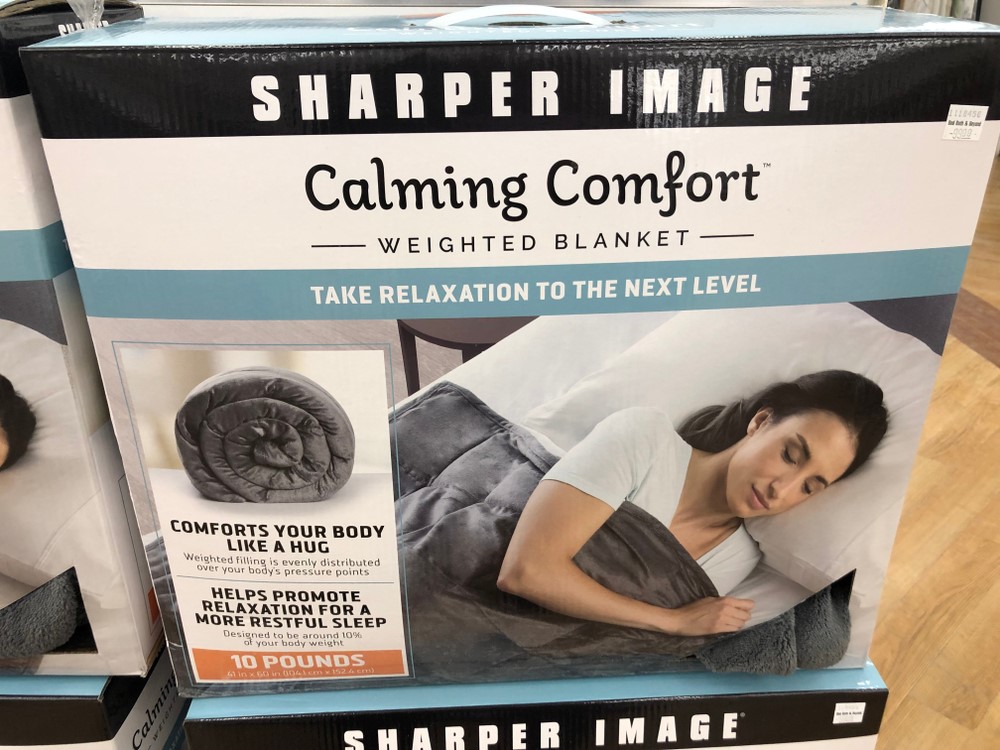
Have you heard about weighted blankets? They’re often used as a therapeutic aid, a way to help people calm down and relax when they’re agitated. The blankets are often used for children with anxiety or autism, but there are also many benefits of weighted blankets for seniors.
In this post, we’re not just looking at the benefits of weighted blankets for seniors. We’re also talking about the types of weighted blankets and how to choose the perfect one.
What Are Weighted Blankets?
Weighted blankets are simply blankets that have extra weight. This weight means that the blanket will push down on your more than a regular one.
Why would you want that?
For one thing, the weight of the blanket makes it feel like you’re being enveloped in a hug. This can be incredibly comforting, especially if you’re stressed or anxious.
The blankets come in plenty of colors and fabrics, making it easy to pick the style that you like. There are other differences too, like the type of filling and the weight.
Why Not Just Pile on Blankets?
You can get a similar amount of pressure by using a large stack of blankets or a thick heavy comforter. Doing so might be appealing in winter, but who wants a load of blankets on them in the height of summer?
While weighted blankets can still be warm, the warmth is much less than you’d expect for the weight.
In fact, you might need a blanket or two on top if you’re using a weighted blanket in the winter.
Benefits of Weighted Blankets for Seniors

Can Help With Loneliness
Loneliness is a serious problem for seniors, especially with COVID-19 restrictions still in place for many people. Even when seniors are free to spend time with friends and family, many still struggle with a sense of isolation.
There are plenty of social apps and other tools to help seniors connect across distance.
Still, these are always limited. Long-distance communication is never quite the same as having someone in the room with you.
Weighted blankets help by simulating the sense of touch. The blankets can even have an oxytocin-releasing effect that you find with a real hug.
Reduces Stress and Anxiety
Many people find that the blankets help with stress and anxiety too. There’s something calming about their weight, helping people to feel more grounded and safer.
While there haven’t been many studies on the topic, one shows that using a weighted blanket decreased anxiety among adults. In that same study, 78% of the participants preferred the weighted blanket as a way to decrease stress.
Can Improve Sleep
The positive effects on stress and anxiety make weighted blankets perfect for sleeping.
They work particularly well for people who often toss and turn. The weight may help with restless leg syndrome too, although there hasn’t been much research into the topic.
Interestingly, a weighted blanket is thought to help with arthritis. This might sound surprising, as the pressure of the blanket can be a little uncomfortable if your joints are painful.
However, a weighted blanket can reduce tossing and turning at night. This is relevant, as tossing and turning lowers quality of sleep and increases the risk of pain and stiffness. So, using a weighted blanket helps to decrease the cycle of pain.
Promotes Independence
Weighted blankets also help with independence, as they provide a way for the senior to comfort themselves, even if no one else is around.
Plus, blankets are a familiar tool and weighted blankets really aren’t that different.
May Be Helpful for Dementia Patients
Dementia patients often struggle with agitation, moodiness, and sleep problems. Weighted blankets could help to reduce some of the symptoms, making patients feel calmer.
Weighted lap blankets could be particularly relevant here, as these can rest on the senior’s lap while they are sitting and may feel less overwhelming than a full blanket. This style could also be relevant for traveling.
Could Be Safer Than A Regular Blanket
For seniors with cognitive challenges, regular blankets may be unsafe, as seniors may pull them up over their face. Weighted blankets reduce the risk of this issue, as they’re too heavily to be easily pulled around.
While weighted blankets might sound like a fad, I can personally attest to their usefulness. I purchased one in the summer, during a period where I was struggling with both anxiety and loneliness.
I wasn’t really convinced about the idea, but I’d been curious for a while and the blanket was on a fantastic special. The one I found was soft, filled with glass beads and a little smaller than a single bed sheet.
The blanket does feel unusual, there’s no denying that. It’s also a pain to move around, as it is much heavier than a regular blanket. However, there is something incredibly comforting about the weight and the warmth of the blanket.
I’ve found that it helps me sleep if I’m stressed too. I find that impressive, as I often sleep poorly.
Risks of Weighted Blankets for Seniors
While weighted blankets are safe and comfortable, they’re not a good choice for every situation.
For one thing, the weight might make some seniors anxious rather than comforting them.
To avoid this, make sure that the blanket isn’t too heavy. The senior should be able to pull it over themselves or take it off without any problems at all. If they can’t, then they may feel trapped. A too heavy blanket could lead to issues, like if a senior struggles with incontinence and cannot get up quickly enough.
If the senior is frail, you might need to choose a lighter blanket than is normally recommended.
Talking to the senior’s healthcare provider can help too. They’ll be able to tell you whether a weighted blanket is helpful or risky.
In particular, weighted blankets can be a problem with some health problems, including issues with blood pressure, circulation, diabetes, or breathing. Anyone with a rash, an open wound, or fragile skin should avoid weighted blankets too, as the pressure could easily make such problems worse.
How to Find the Best Weighted Blanket

If you’re interested in the benefits of weighted blankets for seniors, then you’ll need to choose the blanket well. The weight is particularly important here, as you won’t see the same benefits if the blanket is too light.
Weight
The best weight for the blanket will depend on the person using it. A good starting point is a blanket that’s roughly 10% of the person’s body weight, plus perhaps a few pounds more.
So, for example if the senior weighs between 140 and 160 pounds, a weighted blanket of 14 to 16 pounds, or a little more, could be perfect.
This weight is comforting, without making the user feel like their trapped.
Don’t fall into the trap of thinking that a heavier blanket will always be better. You’ll get the most benefits from a blanket that’s just the right weight,
Think about how the blanket will be used as well. If the senior is likely to have a comforter or another blanket on top, then you’ll need a lighter weighted blanket.
Filling
Weighted blankets often use a single filling, like glass beads, pellets, disks, or perhaps seeds. This approach works well and doesn’t add too much to the warmth of the blanket.
Still, blankets with this type of filling can feel odd to begin with. Mine has glass beads within square pouches (much like the one in the image from the start of this section). The beads shift around within these sections when I move.
Some companies take a different approach, using a mix of fillings to create something that feels more like a traditional blanket. Such blankets are often warmer than those with glass beads, although the increased warmth could be helpful in some situations.
Fabric
The combination of filling and fabric will influence how warm your weighted blanket is. My one has a type of felt exterior, which makes it a little too warm in the height of summer.
But you can find ones that are designed to be cooling instead, like a bamboo weighted blanket with glass beads.
There are also covers for weighted blankets. These are useful, as they can be taken off and washed. Washing the weighted blanket itself is much more difficult.
Size
While you can find large weighted blankets, the best ones are small, just a little larger than the person using them. This way they can be snug around the sides and offer the most benefits.
If a larger blanket is preferred, be careful not to let it hang off the edge of your bed. The weight of the blanket means that it will easily slide off during the night.
Should You Try a Weighted Blanket?
Weighted blankets are now easy to find and keep getting cheaper. There’s never been a better time to see whether a blanket like this helps your aging parent. You might even find one helpful for yourself. Seriously. Caregivers struggle with loneliness too, even when they live with the person they’re supporting. The comfort of sleeping under a weighted blanket may just make your days seem a little easier.
Feeling Overwhelmed?
Check out our Caregiving Consulting service for personalized support and guidance.


Leave a Reply